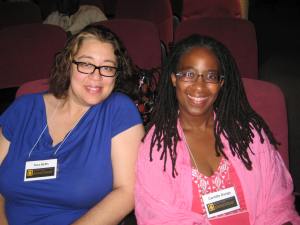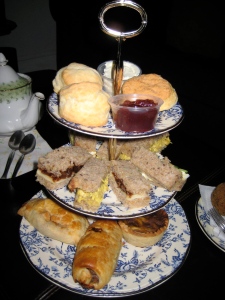 There’s a reading tonight hosted by the Pan-African Writers Association (PAWA) but I was simply too tired to attend; I think jet lag is finally setting in so I opted to stay at the hotel, order room service, and work on my presentation on “configuring the past and present.” I can hear a preacher screaming “Hallelujah!” outside—there must be a church nearby. I’m watching Ghana TV and a women’s show, The Standpoint, just ended—the Oprah equivalent Dr. Gifty had guests and experts on to discuss life after your husband’s death. This has been a day of death, in a way—today’s program ended with an emotional tribute to Jayne Cortez, OWWA co-founder who passed suddenly last December. I only met Jayne twice but it was clear to me that she was a formidable woman. I was surprised to find myself shedding a few tears during the tribute; I watched Ama Ata Aidoo being helped to her feet—someone holding her cane, someone else holding the mic so her hands were free to hold the bowl—and then she spoke in Fante because she knew Jayne wouldn’t want a libation prayer to be said in English. She had to pause midway to pull a kerchief from her blouse and it was very moving to see this elder weeping for her lost friend. They met in the 1970s so that’s a friendship that lasted nearly fifty years, and I couldn’t help but think to myself, “That will be us someday.” I feel so blessed to be here with my close friends—my life has been enriched and enlarged because of these incredible black women who don’t have the anxiety issues that make me too risk-averse and too content to stay at home. Would I have come to Ghana without them? Maybe, but I’m grateful that they continue to “lift me as they climb.”
There’s a reading tonight hosted by the Pan-African Writers Association (PAWA) but I was simply too tired to attend; I think jet lag is finally setting in so I opted to stay at the hotel, order room service, and work on my presentation on “configuring the past and present.” I can hear a preacher screaming “Hallelujah!” outside—there must be a church nearby. I’m watching Ghana TV and a women’s show, The Standpoint, just ended—the Oprah equivalent Dr. Gifty had guests and experts on to discuss life after your husband’s death. This has been a day of death, in a way—today’s program ended with an emotional tribute to Jayne Cortez, OWWA co-founder who passed suddenly last December. I only met Jayne twice but it was clear to me that she was a formidable woman. I was surprised to find myself shedding a few tears during the tribute; I watched Ama Ata Aidoo being helped to her feet—someone holding her cane, someone else holding the mic so her hands were free to hold the bowl—and then she spoke in Fante because she knew Jayne wouldn’t want a libation prayer to be said in English. She had to pause midway to pull a kerchief from her blouse and it was very moving to see this elder weeping for her lost friend. They met in the 1970s so that’s a friendship that lasted nearly fifty years, and I couldn’t help but think to myself, “That will be us someday.” I feel so blessed to be here with my close friends—my life has been enriched and enlarged because of these incredible black women who don’t have the anxiety issues that make me too risk-averse and too content to stay at home. Would I have come to Ghana without them? Maybe, but I’m grateful that they continue to “lift me as they climb.”
 I don’t think I can do justice to the four panels I attended today. The first was on getting your work out into the world, and moderator Tara Betts (right, with Camille Dungy) drew rich insights from the three panelists. Latasha Diggs (below right, with Gabrielle Civil)reminded us that it’s not *always* about the book—having one doesn’t make you legitimate, doing the WORK and getting it out there (by yourself, if necessary) is what matters most along with building community. How can you ward off competition between you and your fellow writers? Hang with musicians and other artists working in different media. Kadija George Sesay, publisher of Sable magazine, urged self-publishers to register their publications and get an ISBN/ISSN; that means your work can be catalogued, archived, and then you can be certain that you’re
I don’t think I can do justice to the four panels I attended today. The first was on getting your work out into the world, and moderator Tara Betts (right, with Camille Dungy) drew rich insights from the three panelists. Latasha Diggs (below right, with Gabrielle Civil)reminded us that it’s not *always* about the book—having one doesn’t make you legitimate, doing the WORK and getting it out there (by yourself, if necessary) is what matters most along with building community. How can you ward off competition between you and your fellow writers? Hang with musicians and other artists working in different media. Kadija George Sesay, publisher of Sable magazine, urged self-publishers to register their publications and get an ISBN/ISSN; that means your work can be catalogued, archived, and then you can be certain that you’re  leaving a record behind.
leaving a record behind.
 During the brief break Michelle Martin and I went down to the book vendors and did a bit of shopping. No more books! I think I’ve bought ten so far, mostly for my nieces and nephew, though I got a couple of novels for myself today. It’s so wonderful to have the authors sign their books, too. I had lunch with Yolanda Arroyo Pizarro and was thrilled to get an English translation of her novel, Carapace. She and her partner Zulma also wrote out a list of Afro-Latino women writers whose work is available in English. I want to add more Latina content to my Black Women in the Americas class. I was disturbed to learn that Yolanda and Zulma were harassed and threatened in the Osu market earlier this week, but it was wonderful to learn that their homeland of Puerto Rico recently passed legislation protecting the rights of LGBT people. Maybe the jetlag is making me emotional or maybe it’s just being in the presence of so many amazing women—I feel protective of everyone! Protective and powerless at the same time. I should switch gears and go work on my talk because these are the issues I want to address: is it enough to rewrite history, to write black women back into the historical record through art and/or scholarship, or must we MAKE history ourselves? I feel like history is made by women who are bolder than me, but maybe that’s just what I want to believe…
During the brief break Michelle Martin and I went down to the book vendors and did a bit of shopping. No more books! I think I’ve bought ten so far, mostly for my nieces and nephew, though I got a couple of novels for myself today. It’s so wonderful to have the authors sign their books, too. I had lunch with Yolanda Arroyo Pizarro and was thrilled to get an English translation of her novel, Carapace. She and her partner Zulma also wrote out a list of Afro-Latino women writers whose work is available in English. I want to add more Latina content to my Black Women in the Americas class. I was disturbed to learn that Yolanda and Zulma were harassed and threatened in the Osu market earlier this week, but it was wonderful to learn that their homeland of Puerto Rico recently passed legislation protecting the rights of LGBT people. Maybe the jetlag is making me emotional or maybe it’s just being in the presence of so many amazing women—I feel protective of everyone! Protective and powerless at the same time. I should switch gears and go work on my talk because these are the issues I want to address: is it enough to rewrite history, to write black women back into the historical record through art and/or scholarship, or must we MAKE history ourselves? I feel like history is made by women who are bolder than me, but maybe that’s just what I want to believe…
 The afternoon panel on Africa, the diaspora, and children’s literature was great. One Ghanaian panelist talked about the need to ensure that girls on the continent have access to education—whether it’s in a traditional school, via cell phone, or on the radio. Another Nigerian panelist, Akachi Ezeigbo, talked about her decision to write girls as heroines in her books for young readers, and Michelle Martin captivated the audience with her slideshow and talk on hair politics in children’s picture books. Deborah Ahenkorah doubled as panelist and moderator and had a chance to share her innovative strategies for getting books into the hands of Ghanaian kids. “If we can send a man to Mars, we can ensure that Ghanaian children have culturally relevant, quality books!” Stay tuned for an interview with Deborah in the next day or two…
The afternoon panel on Africa, the diaspora, and children’s literature was great. One Ghanaian panelist talked about the need to ensure that girls on the continent have access to education—whether it’s in a traditional school, via cell phone, or on the radio. Another Nigerian panelist, Akachi Ezeigbo, talked about her decision to write girls as heroines in her books for young readers, and Michelle Martin captivated the audience with her slideshow and talk on hair politics in children’s picture books. Deborah Ahenkorah doubled as panelist and moderator and had a chance to share her innovative strategies for getting books into the hands of Ghanaian kids. “If we can send a man to Mars, we can ensure that Ghanaian children have culturally relevant, quality books!” Stay tuned for an interview with Deborah in the next day or two…
The fourth panel was intense; four writers talked about their activism and the ways they channel the ancestors in order to better serve their community around issues like environmental justice and domestic violence. You can learn more about the important, community-based projects coordinated by Angelique Nixon’s nonprofit Ayiti Resurrect. Moderator (and friend!) Ira Dworkin moderated and gave us all an update on the challenges facing women writers in Egypt. You can learn more about the threats facing Mona Prince here.
Ok, time to turn in. I haven’t actually left the hotel compound yet so I’m looking forward to tomorrow’s lineup, which includes a performance by Wura-Natasha Ogunji, Rosamond S. King, and Gabrielle Civil. We start here and then finish at the seashore…


















